eCommerce
Sales Forecasting Software: Using CRM with AI Integrations
November 24, 2023 • 240 Views • 15 min read
Tetiana Stoyko
CTO & Co-Founder
Each modern business is based on data-driven decision-making (DDDM. It helps to make a more accurate prediction and, therefore, make more balanced choices, based on valuable insights.
Thanks to the evolution of FinTech software development technologies, such sales forecasting methods have gained the possibility to reach new horizons in your sales cycle.
Yet, before getting into the discussion on whether it is worth developing custom sales forecasting software with AI integrations on board, or choosing a ready-made SaaS software development solution, what are the pros and cons of each of these predictive models, let’s learn the basics.
So, what sales forecasting software is, and what it is used for?
Sales Forecasting Software in a Nutshell
First of all, what does sales forecasting mean?
Judging from the name, it is a way to predict the potential sales or income ratio. Sales forecasting is based on historical data and recent information analysis, which helps to define previous and future trends and overall demand for certain products or services.
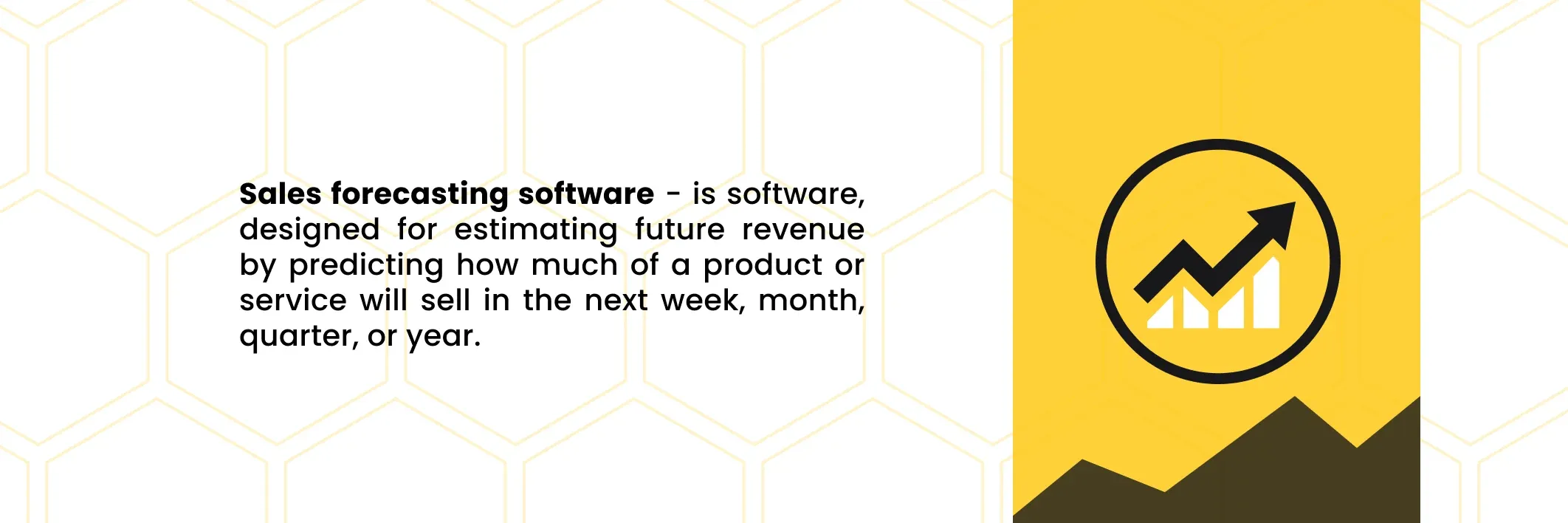
In other words, sales forecasting accuracy is mainly based on data gathering and analysis. So, sales forecasting software is a technological solution, designed to simplify these processes and provide business specialists with a more convenient and automated toolkit, that can potentially help to automate some routine or repetitive tasks and provide more accurate calculations.
One of the biggest mistakes is to think, that such software is too complex and mainly used by big corporations. As a matter of fact, even the smallest modern businesses are capable of adopting such solutions to increase their own efficiency exponentially.
Another false statement is that such prediction instruments can be used only by marketplaces or other eCommerce platforms. Indeed, they are among the most common users of such software, yet sales forecasting is an industry-agnostic solution, that can, and most certainly should, be used in any case of product or service distribution.
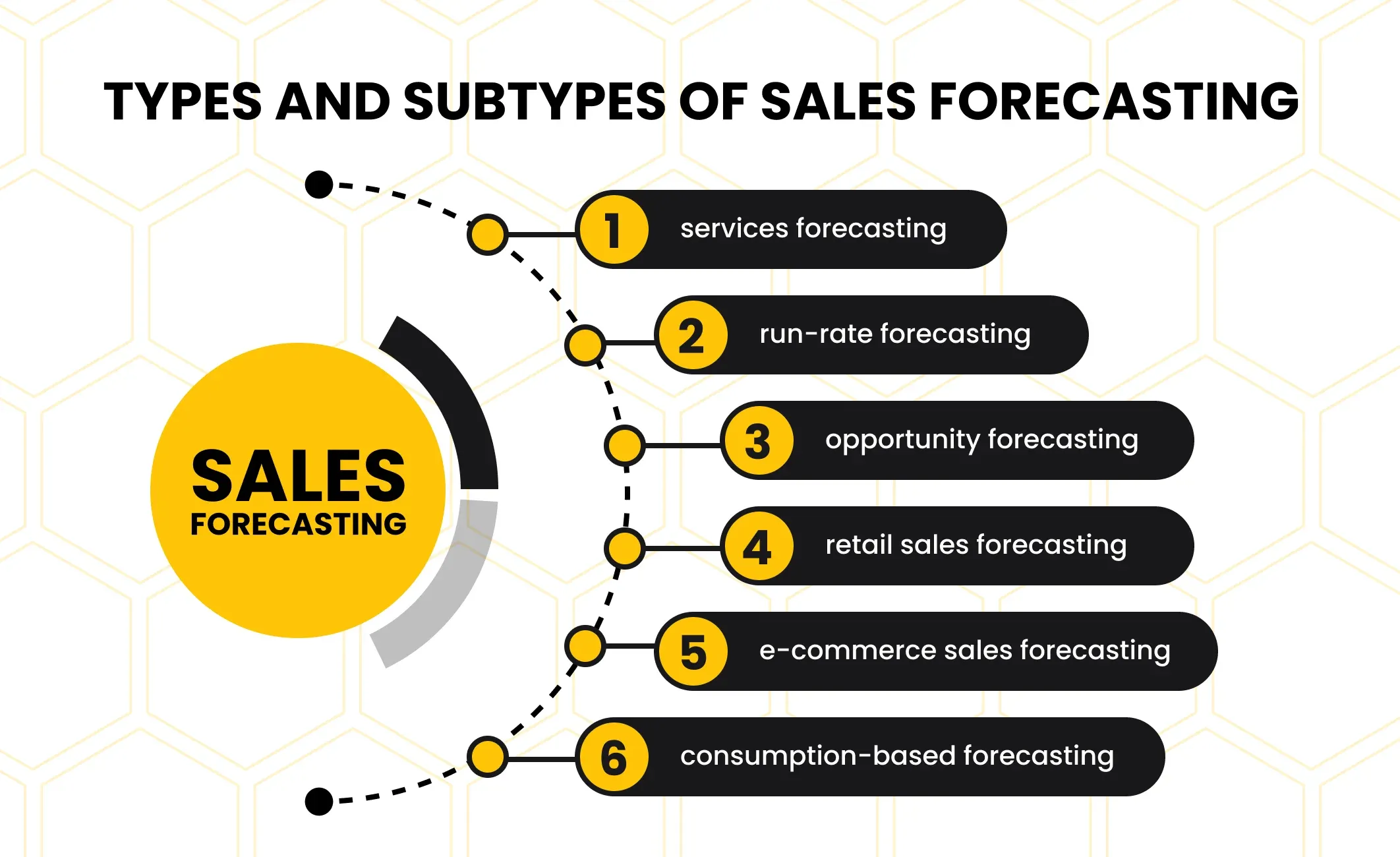
Eventually, sales forecasting can be divided into numerous types and subtypes such as:
- Opportunity forecasting
- Retail sales forecasting
- E-commerce sales forecasting
- Services forecasting
- Consumption-based forecasting
- Run-rate forecasting
Nevertheless, these are related to customer relationship management systems and are commonly considered as part of their functionality. Most data gathering and analysis is performed in terms of the CRM system itself.
Alternatively, the analysis results or customer data can be displayed in external applications in different ways for better user experience and in a more user-friendly manner, for instance, as a dashboard.
How to Forecast Sales?
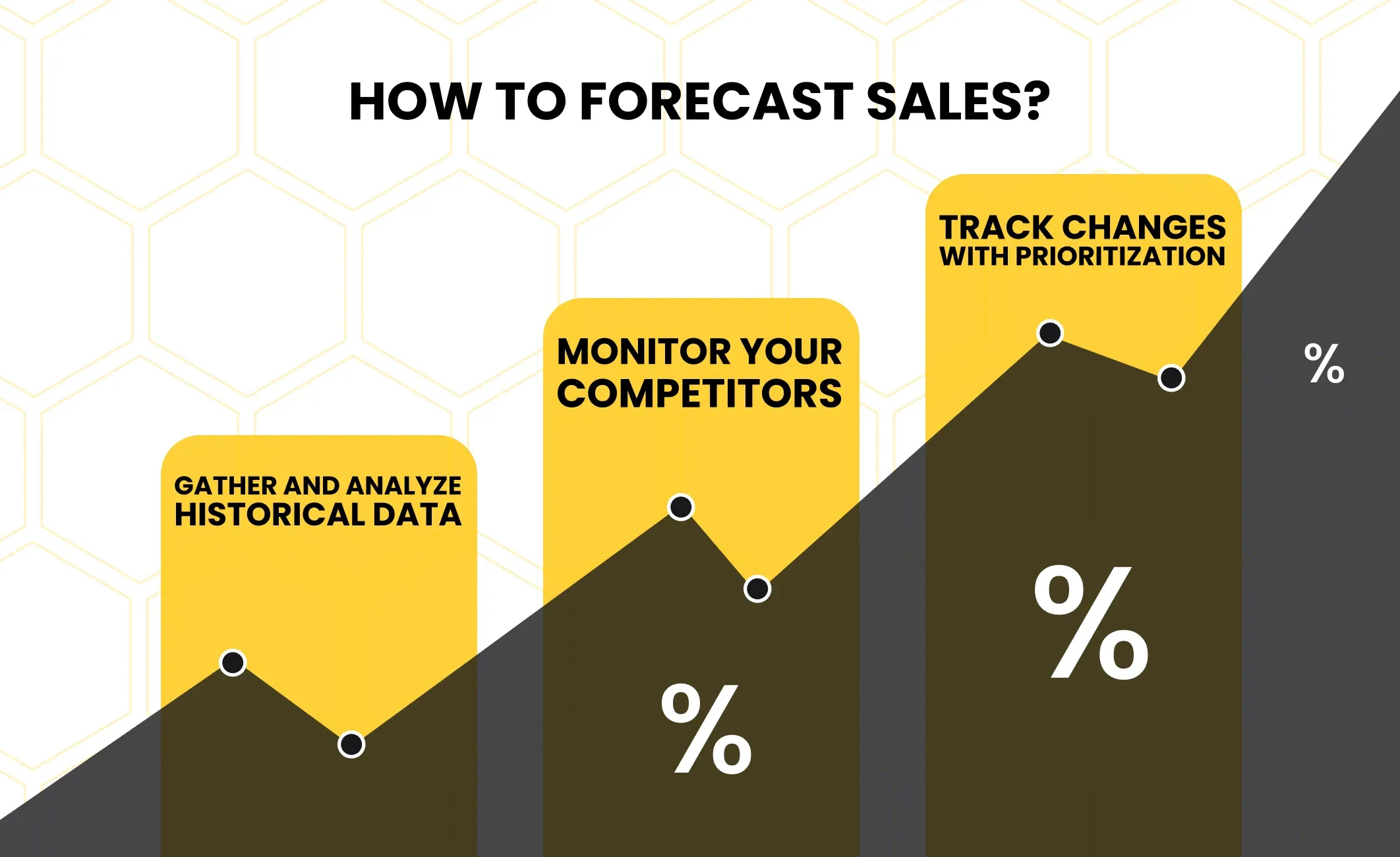
The best way to understand what features you need to develop for your sales forecasting system - is to learn the algorithm of how to perform sales forecasts.
Gather and Analyze Historical Sales Data
To make a prediction, you will need some analytical basis to take into account.
A single piece of information from the past on a particular product won’t give you much. However, if you gather such data for a certain period like a year, you will get a clear view of the trends and possible circumstances, which can impact the growth of demand or price on a particular product.
Therefore, the first, and most important feature of your sales forecasting software is the possibility to store and manage Big Data with the possibility to analyze them later.
Monitor Your Competitors
Regarding your business nature, there are always competitors.
Therefore, you will always need to be ahead of them. One of the most efficient ways to do so - is to monitor them. It includes not only tracking the recent changes like the increased price, advertisement strategy, etc., but historical data on different events as well.
For instance, apart from looking for tendencies in your history, it would be beneficial to be able to analyze long-term changes in your rivals' data.
To rephrase, you will also need the possibility to gather third-party data and include it in your analytics.
Track Changes Via Priority Settings
Eventually, it is a great advantage to enable the possibility of defining priorities such as pricing, potential customer retention, target audience definition, advertisement and promotions, etc.
In other words, having the possibility to define a particular element and track the possible changes to happen or to make to achieve certain results will bring great value to your analysis and sales prediction potential.
The Role of AI in Sales Forecasting
So, after figuring out the most basic principles of this process, we can discuss the potential benefit of adopting an AI in sales forecasting software.
As was mentioned before, such technologies are mainly designed for data-driven insights analysis and decision-making and, therefore, are required to deal with large arrays of data. The more historical data can be processed - the better and more accurate the prediction will be.
Unfortunately, the more information you need to take care of - the bigger the possibility of the human factor, i.e. the mistake rate.
This is where artificial intelligence comes in handy.
One of the biggest advantages of such technology is machine learning models, which allow you to train the virtual assistant to perform almost any manual task you need. Additionally, its training process is based on data analysis and there is probably no such powerful software solution, that can compete with AI when it comes to dealing with Big Data.
Nowadays, even common AI-powered instruments like ChatGPT can be used to achieve incredible results in data analysis in almost no time, not to mention custom-made or specialized AI-powered software, distributed online as a SaaS solution.
Additionally, AI-based models have shown unbelievable results in the field of prediction and finding patterns. For instance, some artificial intelligence techniques are already being tested in terms of disease diagnosis and prediction. In some cases, they even can overcome experienced medical professionals in their field.
Nevertheless, despite all the successful examples, don’t forget, that AI is still in the testing stage and it is hard to tell how accurate it is, so even after adopting such technology for your purposes, do not blindly follow its prognoses. Instead, consider it as a powerful, yet additional instrument in your routine.
Developing AI-Driven CRM
One of the most essential components, required for sales forecasting is different types of customer data.
Frankly, almost any customer relations management system will provide you with the most needed information for your further market analysis and forecasting. Thus, one of the most efficient ways to improve your sales forecasting is to improve your AI-powered CRM tools and add some extra features, instead of developing a full-fledged standalone application.
Customer relation management is a process, performed in terms of any business. Specialized software, designed to upscale and automate related activities, is also a common phenomenon nowadays. So, any business owner can use it as a basis for further business process planning and sales forecasting. AI integration will be an extra advantage for such purposes.
Advantages of AI-Powered CRM Systems
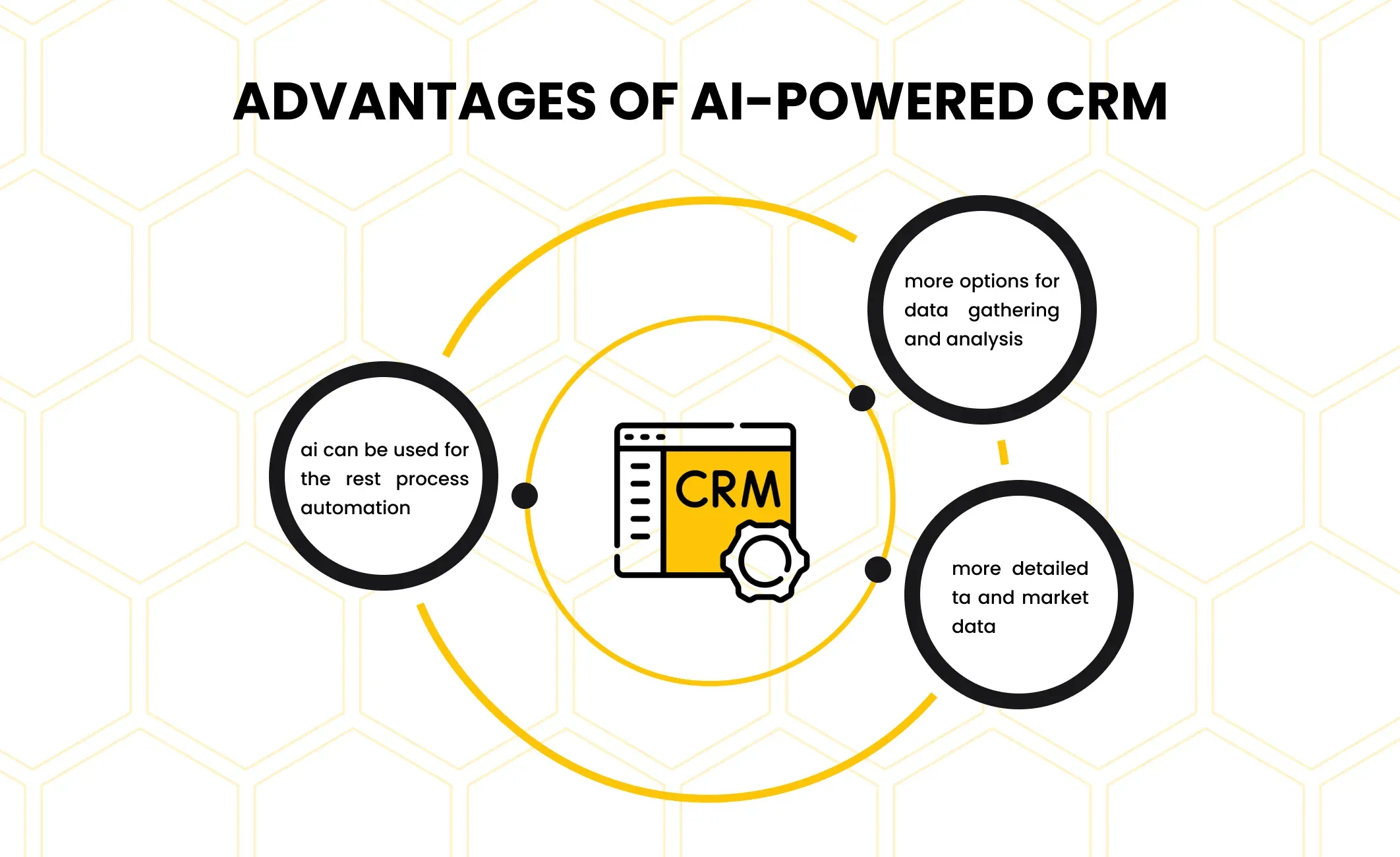
Among the advantages of AI adoption for sales forecasting or customer relations management, it is possible to name at least a few most crucial ones.
First of all, it brings more capabilities in data gathering and analysis, providing data specialists with numerous instruments, and allowing the automation of certain routine tasks.
Additionally, modern AI-powered solutions can help you gather more detailed data, i.e. getting more information processed and analyzed at the same time. Thus, business owners will be able to create a more detailed portrait of their target audience, learn their expectations, needs, gain more accurate insights, customer queries, their engagement level, take external factors like market trends into account, etc. Having such information brings a variety of behavior possibilities, allowing for more efficient business plans and more accurate sales forecasting.
Finally, artificial intelligence can be used for other purposes as well. Apart from training it to make data-driven predictions on potential sales or income, you can also use it for, let’s say, customer satisfaction and support. One of the most distinctive key features of any AI-powered tool is the fact, that they are not limited to the particular industry.
You can train such generative AI and provide them with more detailed information on specific topics, making the outcome better in certain fields. Nevertheless, it can be easily upscaled and trained to perform extra tasks, depending on how scalable they are.
To rephrase it, even if you are considering adopting an AI for a particular reason and to automate certain activities, you can always transform it into a full-fledged virtual assistant, which can significantly upscale your whole software product.
Custom CRM vs SaaS Comparison
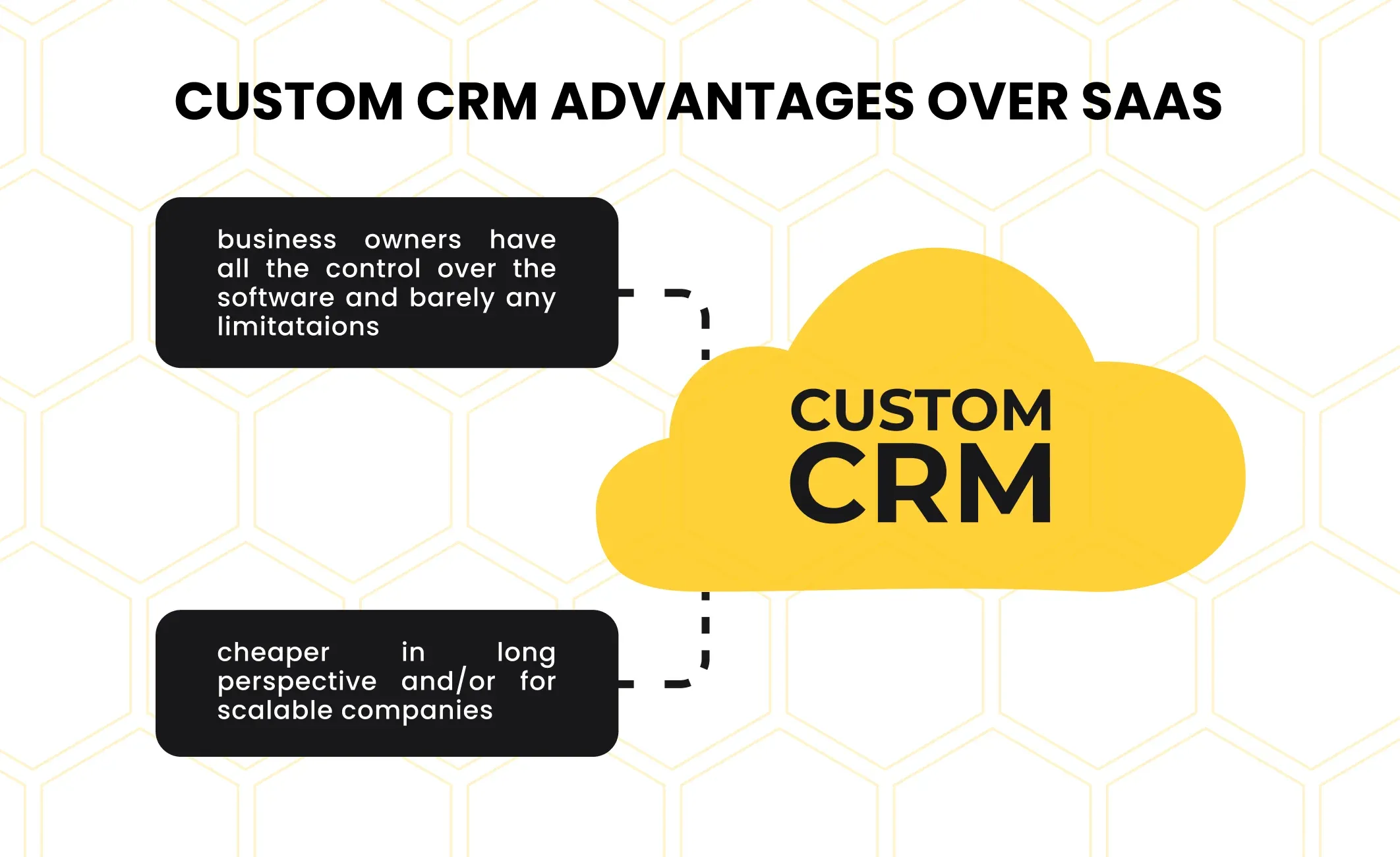
Frankly speaking, most modern ready-made solutions, including both CRM systems and other sales tools for forecasting are proposing all possible features, including different types of AI. Also, they require no technical skills from you or your team, i.e. all you need is to pay a fee and use it, skipping all development cycles.
So, having such products at hand, why would you even consider a custom CRM and sales forecasting software development?
To cut a long story short, there are two main reasons to consider custom system development:
- It is cheaper in the long term. Having your products and powerful tools always ends up cheaper in perspective: the bigger your company is and the longer you are willing to use this type of software - the smaller the final price will be.
- You will have full control. As a result, you will have everything needed for integrating AI, and developing other new features or functionality whenever you want without the need to contact your service provider and discuss such a possibility. All you will need for real-time updates - is a dedicated team of niche-experienced developers, who are ready to embody any your request.
Sales Forecasting Software with Incora
Despite all the foregoing, making a final decision is not an easy task.
To make a more informed decision, we highly encourage you to get in touch with IT vendors like software development companies with proven experience in this or related field. This will help you to better understand all potential strengths and weaknesses of each approach, their impact on your business growth, as well as different details like the accuracy of sales forecasts and risk levels.
For instance, you can contact us for more details and our dedicated software development team members will answer all your questions. Besides, during our discussion, we will also make a brief estimation of potential development, how much it may cost and how long will IT outsourcing take to deliver a high-quality product. Thus, you will have more than some facts, but also approximate numbers, which can help you to make a final choice.
Still, before contacting us, you can also check our case studies to better understand what other services we can propose and what extra functionality you might be interested in.
What’s your impression after reading this?
Love it!
1
Valuable
1
Exciting
1
Unsatisfied
1
FAQ
Let us address your doubts and clarify key points from the article for better understanding.
What is Sales Forecasting Software?
Sales Forecasting Software is a tool designed to predict future sales based on historical data, market analysis, and various other factors. It helps businesses make informed decisions, allocate resources efficiently, and set realistic sales targets.
How does CRM integrate with Sales Forecasting Software?
CRM integration with Sales Forecasting Software allows for seamless data exchange between customer relationship management tools and the forecasting system. This integration ensures that sales data, customer interactions, and other relevant information are used to generate accurate forecasts.
What are the benefits of integrating AI with CRM in Sales Forecasting Software?
Integrating Artificial Intelligence (AI) with CRM enhances the accuracy of sales forecasts by analyzing vast amounts of data quickly. AI can identify patterns, trends, and customer behaviors that may be challenging for traditional methods to recognize, leading to more precise predictions.
How does AI contribute to better sales forecasting?
AI in Sales Forecasting Software leverages machine learning algorithms to analyze historical data, customer interactions, and market trends. It adapts and learns from new information, continuously improving its forecasting capabilities. This results in more accurate predictions and better-informed decision-making.
Can Sales Forecasting Software with CRM integration be customized for different industries?
Yes, many Sales Forecasting Software solutions with CRM integration offer customization options to cater to the specific needs of different industries. This may include adjusting parameters, incorporating industry-specific data sources, and tailoring the system to match the unique characteristics of each business sector.
Can Sales Forecasting Software handle real-time data?
Many advanced Sales Forecasting Software solutions with CRM integration have the capability to handle real-time data. This ensures that the forecasts are based on the most up-to-date information, allowing businesses to respond quickly to market changes and trends.
YOU MAY ALSO LIKE
Let’s talk!
This site uses cookies to improve your user experience. Read our Privacy Policy
Accept
Share this article